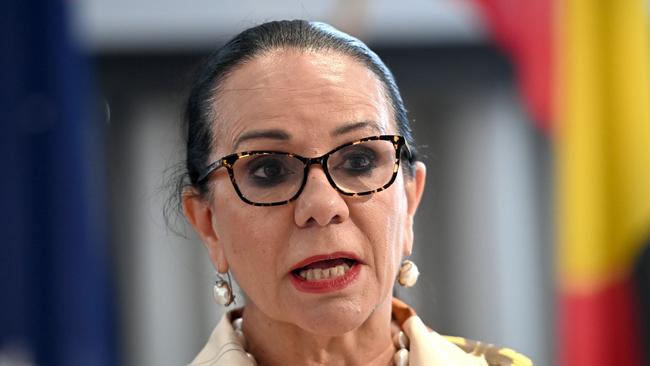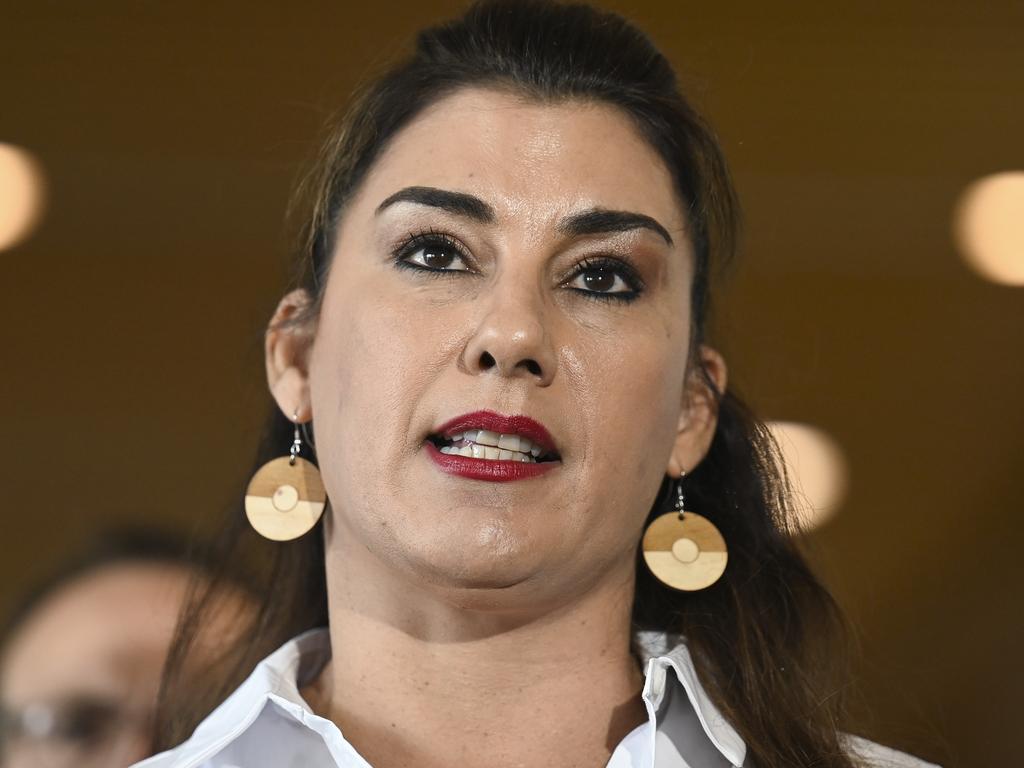NT ‘got it wrong’ on Alice Springs, says Linda Burney
Indigenous Australians Minister Linda Burney has placed responsibility for the alcohol-fuelled crime wave in Alice Springs squarely on the NT government.

Indigenous Australians Minister Linda Burney has placed responsibility for the alcohol-fuelled crime wave in Alice Springs squarely on the Northern Territory government, declaring even it admits “they actually got it wrong” by not imposing tougher alcohol restrictions sooner.
Anthony Albanese also left open the option of reintroducing blanket grog bans in remote areas, which were removed in July last year when the Commonwealth’s Stronger Futures in the Northern Territory legislation lapsed.
While NT Chief Minister Natasha Fyles has defended her territory’s alcohol restrictions, including banning high-risk people from buying alcohol and others from supplying it to them, Ms Burney said some local residents felt the territory government took too long to act as young people took to the streets and robberies, serious assaults and domestic violence increased.

“I have been in discussions with the Northern Territory government and community organisations here in Alice Springs for a number of months and, yes, I have expressed that there needs to be some very, very real thoughts put into alcohol restrictions,” Ms Burney told ABC radio.
“There is an enormous flash point here in Alice Springs at the moment, which is why the Prime Minister visited yesterday, which is why the Northern Territory government, who admitted freely that they actually got it wrong and they’re putting in place emergency measures today in relation to restrictions.”
“I‘m not going to get into whether they’ve taken too long or they haven’t, but clearly, if you ask people in Alice Springs, the answer might be yes. But the most important thing is that we made enormous gains yesterday.”
Amid warnings the crisis in Alice Springs is worse than a decade ago, the NT government has introduced new restrictions on alcohol sales in Alice Springs, imposing takeaway alcohol bans on Mondays and Tuesdays and limiting sales to one person per day.
The Prime Minister and Chief Minister have also flagged communities may soon have to ask to opt-out of blanket alcohol bans, rather than the current approach taken by the territory of allowing remote communities to opt-in.
Dorelle Anderson has been appointed the new central Australian regional controller and will report back to both governments on February 1 on what more she believes is needed to combat the surge in alcohol-fuelled violence.
On the reintroduction of blanket community-wide alcohol bans, Mr Albanese told Sky News: “That‘s an option that we completely have said is there on the table.
“You’ve got to remember that this change (Stronger Futures) was introduced by a former Labor government in 2012. It lasted for 10 years, the former government chose to allow that to lapse.
“It isn‘t just alcohol. There’s a range of issues there that go to Indigenous disadvantage, that go to a lack of employment.”
Ms Fyles on Wednesday suggested the electoral commission could conduct formal ballots across the territory to determine which communities wanted alcohol-wide bans but the idea was dismissed by federal government sources, who said it was a diversion from the NT’s own failures.
Ms Burney’s spokesman said a ballot was not discussed with the Minister when she visited Alice Springs with Mr Albanese and Mr Fyles on Tuesday.
“We can’t look at Alice Springs in isolation, we need to look at the broader community and this (alcohol bans) is something where communities have had the option to opt-in to being a dry community,” Ms Fyles told ABC radio.
“Do we go out to a ballot? Do we get the electoral commission to go out to these communities … and then the matter can be settled confidently knowing all views can be heard?”
NT electoral commissioner Iain Loganathan said the ballots were possible but would require clearly defined rules processes.
He was not aware of similar ballots in the past.
“There needs to be a clearly defined rules and processes. This would include clarification on who is entitled to vote, is it a compulsory ballot and details of the information campaign to inform electors the purpose of the ballot,” Mr Loganathan told The Australian.
A review conducted for the Morrison government and released by Labor after the May election found the blanket approach to alcohol restrictions under Stronger Futures “reduced high levels of misuse” but it was difficult to quantify the reduction.
It was also difficult to isolate the impact of the federal government legislation, which was introduced by Labor in 2012, from new measures introduced by the NT government to address alcohol misuse.
“The review identifies a number of communities could be left without a similar level of alcohol restrictions, as currently exist, when the SFNT Act sunsets as alcohol protected areas (APAs) will cease. This could increase the risk of alcohol-related harm in those communities,” the National Indigenous Australians Agency review states.
“The review suggests the NT government’s regulatory and policy framework can address this risk by extending restrictions where appropriate before the SFNT Act sunsets to ensure effective alcohol policies are in place.”
The Morrison government allowed the Stronger Futures legislation to lapse and sources familiar with the review process said that, rightly or wrongly, the Coalition found the Commonwealth’s role in imposing alcohol restrictions in the territory had run its course and the NT government was in a position to take ownership.
Deputy opposition leader Sussan Ley said the government’s response to what was happening in Alice Springs needed to be stronger and should have happened “long ago”.
“We saw legislation lapse in July last year, at that time community leaders appealed to this government to reintroduce legislation to make alcohol less available, so that it would cause less harm. And all Anthony Albanese did was refer this to a Senate committee,” Ms Ley said.
“At the same time the Northern Territory changed the grog laws so remote communities had and have more access to alcohol. So, what needs to happen now is a far stronger response to what we have see. A response that better reflects what the community is calling for.”






